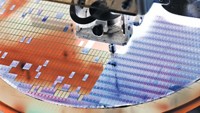Advertisement
Grab your lab coat. Let's get started
Welcome!
Welcome!
Create an account below to get 6 C&EN articles per month, receive newsletters and more - all free.
It seems this is your first time logging in online. Please enter the following information to continue.
As an ACS member you automatically get access to this site. All we need is few more details to create your reading experience.
Not you? Sign in with a different account.
Not you? Sign in with a different account.
ERROR 1
ERROR 1
ERROR 2
ERROR 2
ERROR 2
ERROR 2
ERROR 2
Password and Confirm password must match.
If you have an ACS member number, please enter it here so we can link this account to your membership. (optional)
ERROR 2
ACS values your privacy. By submitting your information, you are gaining access to C&EN and subscribing to our weekly newsletter. We use the information you provide to make your reading experience better, and we will never sell your data to third party members.
Electronic Materials
JSR to be taken private by Japanese government
Move is intended to boost the competitiveness of the country’s semiconductor materials industry
by Katsumori Matsuoka, special to C&EN
June 28, 2023
| A version of this story appeared in
Volume 101, Issue 21

The Japanese chemical maker JSR has agreed to be acquired by Japan Investment Corp. (JIC), an investment firm backed by the Japanese government. A key goal of the deal, JSR says, is to boost the competitiveness of Japan’s semiconductor materials industry through investment and restructuring.
JIC is offering to pay about $6.3 billion for JSR, which represents a 30% premium over its average share price during the month before the deal was announced. JSR had sales of about $2.9 billion in its most recent fiscal year. All the firm’s directors have endorsed the purchase, CEO Eric Johnson said at a June 26 press conference.
At the press conference, Johnson called JSR a critically important part of Japan’s materials science ecosystem. “Going private under a strategic partner will allow us to make bold, medium- to long-term strategic investments and flexibly promote structural reforms and industry reorganization,” he said.
JSR is one of the world’s leading producer of photoresists, used to create circuit lines on silicon wafers during the computer chip fabrication process. But Johnson, the rare American head of a Japanese chemical company, said both customers and competitors are consolidating, making it necessary to improve the efficiency of JSR’s R&D. This requires industry restructuring—something JSR can more easily participate in as a private firm.
“The investment pressure to stay on the leading edge, both in terms of capital and R&D resources, is intense,” Johnson added. “We feel that reform is critically important for long-term global competitiveness.”
JSR was established in 1957 as Japan Synthetic Rubber to ensure a stable supply of rubber for the country. JSR sold the rubber business to Eneos Holdings in 2021 and now concentrates on semiconductor materials and a life sciences business.
Takahiro Shinada, deputy director of the Center for Innovative Integrated Electronics Systems at Tohoku University, says it’s notable that JSR approached JIC about striking a deal. Shinada points out that the weak yen has made it easier to acquire Japanese companies and that the purchase by a government-affiliated entity might be intended to preempt a foreign takeover.
This story was updated on June 29, 2023, to correct the last name of the CEO of JSR, Eric Johnson. In two instances he was called Norris.





Join the conversation
Contact the reporter
Submit a Letter to the Editor for publication
Engage with us on Twitter